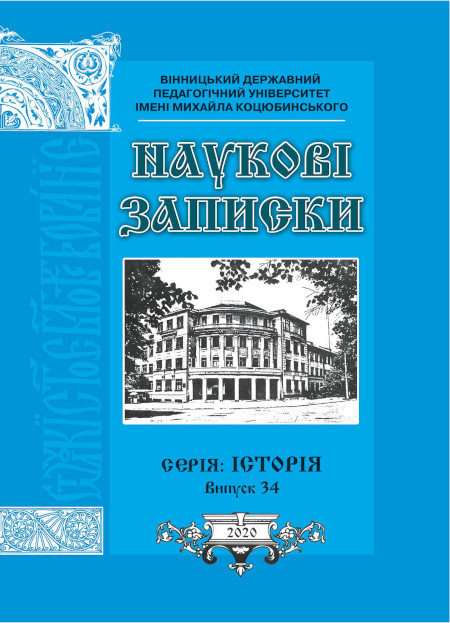Abstract
The purpose of the article is to clarify the features of the Polish reaction to cultural and social activities of M. Hrushevsky in Galicia at the end of the 20-th - beginning of the 21-st century. The methodological basis is an interdisciplinary approach. Particular emphasis is placed on the structural-functional systematic analysis of historiographical facts and the method of critical analysis of documentary material. The scientific novelty of the article lies in an attempt to analyse the reaction to cultural and social activities of M. Hrushevsky in the pages of Polish journalism at the end of the 20-th - beginning of the 21-st century. Conclusions. As a result, we would like to note that in contrast to the ambivalent attitude of Polish intellectuals to the scientific works of M. Hrushevsky, their assessments of his cultural and social activity were unanimously negative. Polish politicians from the opposing camps united in their reckless rejection of the demand for at least apparent equality in the civil rights of Ukrainians and Poles in the Galician region. This attitude was the result of the solidary conviction of all political elites about the historical “Polishness” of the East Galician territories, where Ukrainians can only have the rights of a national minority. Therefore, instead of an adequate reception of M. Hrushevsky’s proposals regarding the normalization of the Polish-Ukrainian dialogue, Polish journalism mostly resorted to profanation and ridicule of his initiatives in order to portray the opponent as a hopeless dreamer or a dangerous radical. Such a rejection of M. Hrushevsky’s proposals for the establishment of interethnic understanding on the basis of mutual respect and equality resulted, as we know, in many tragic events in the Polish-Ukrainian history of the first half of the twentieth century.
References
Грушевський, М. (1897). Добиваймося свого університету! Діло, ч. 147, с. 1.
Тельвак, В. (2017). Михайло Грушевський та Олександр Барвінський на тлі українського руху кінця ХІХ – першої третини ХХ століття. Записки НТШ. Праці Історично-філософської секції, т. CCLXX, с. 82-102.
Тельвак, В. (2006). Постать Михайла Грушевського в польській історіографії (кінець ХІХ-ХХ ст.). Український історичний журнал, № 5, с 67-82.
Тельвак, В. (2008). Творча спадщина Михайла Грушевського в оцінках сучасників (кінець ХІХ – 30-ті роки ХХ століття). Київ–Дрогобич: «Вимір», 494 с.
Тельвак, Віталій & Тельвак, Вікторія (2013). Грушевськіана Францішка Равіти-Гавронського. Spheres of culture. Journal of Philological, Historical, Social and Media Communication, Political Science and Cultural Studies, volume IV, s. 244-251.
Тельвак, Віталій & Тельвак, Вікторія (2019a). Михайло Грушевський та польсько-українське протистояння у Львівському університеті. Українські та польські інтелектуали в другій половині ХІХ – першій третині ХХ ст. : співпраця, конфлікти, рецепція : колективна монографія / за редакцією Віталія Тельвака. Херсон : Видавничий дім «Гельветика», с. 35-48.
Тельвак, Віталій & Тельвак, Вікторія (2019b). Образи Михайла Грушевського в польській інтелектуальній культурі кінця ХІХ – початку ХХІ століття. Українські та польські інтелектуали в другій половині ХІХ – першій третині ХХ ст. : співпраця, конфлікти, рецепція : колективна монографія / за редакцією Віталія Тельвака. Херсон : Видавничий дім «Гельветика», с. 172-200.
Фінкель, Л. (1901). Як то було. Діло, ч. 260 і 261, с. 2.
Dybowski, B. (1906). Z powodu artykułu prof. Hruszewskiego. Słowo Polskie, № 377, s. 3; № 379, s. 3-4.
F.K. [Koneczny F.] (1907). M. Hruszewśkyj, Galicja i Ukraina. Swiat Slowiański, luty, s. 136-141.
Kamiński, J. (1909a). Nowy przyczynek do charakterystyki szkoły historycznej prof. Hruszewskiego. Słowo Polskie, № 587, s. 1-2; № 589, s. 1-3.
Kamiński, J. (1909b). Przyczynek do charakterystyki szkoły historycznej prof. Hruszewskiego. Słowo Polskie, № 528, s. 1-2; № 530, s. 1-2.
Kolankowski, L. (1908). Pomysły i idee ukraińskie Prof. M.Hruszewskiego. Świat Słowiański, styczeń, s. 19-30.
Kulczycki, L. (1912). Ugoda Polsko-Ruska. Lwów: z drukarni udziałowej we Lwowie, 79 s.
Rawita-Gawroński, Fr. (1912). Kwestya ruska wobec Austryi i Rosyi. Świat Słowiański, sierpień-wrzesień, s. 557-578.

This work is licensed under a Creative Commons Attribution 4.0 International License.
Copyright (c) 2020 Scientific Papers of the Vinnytsia Mykhailo Kotsiubynskyi State Pedagogical University. Series: History





